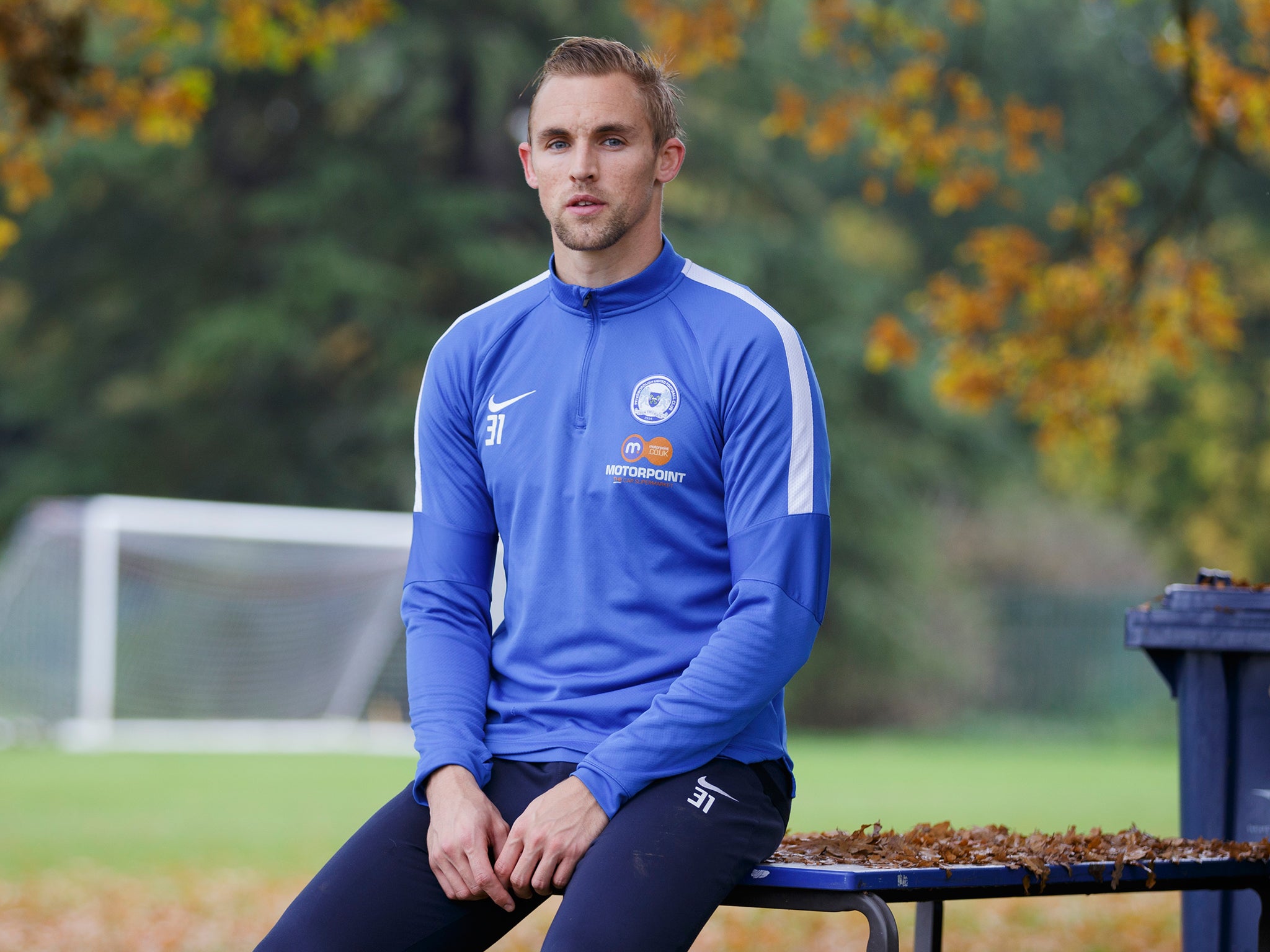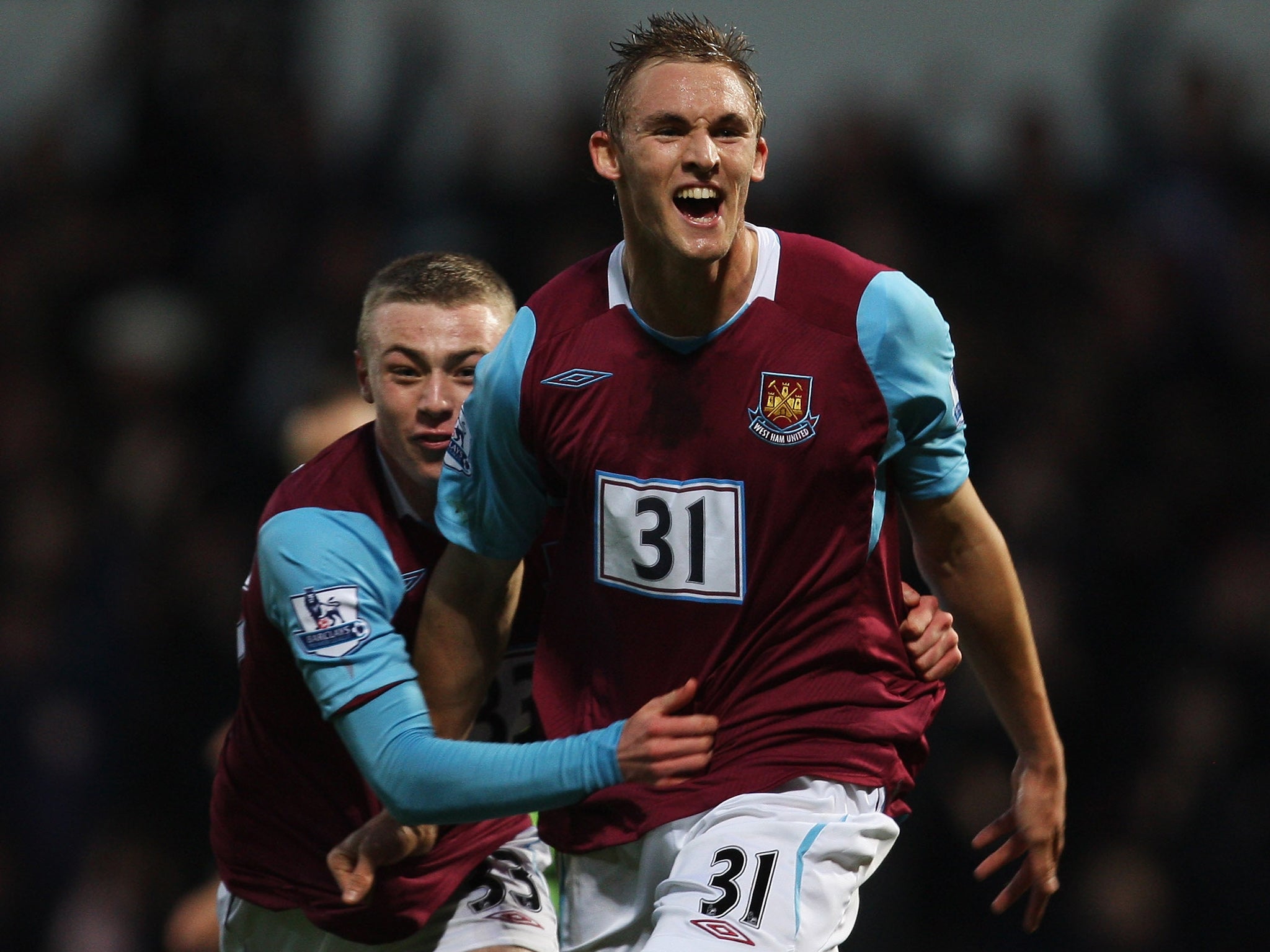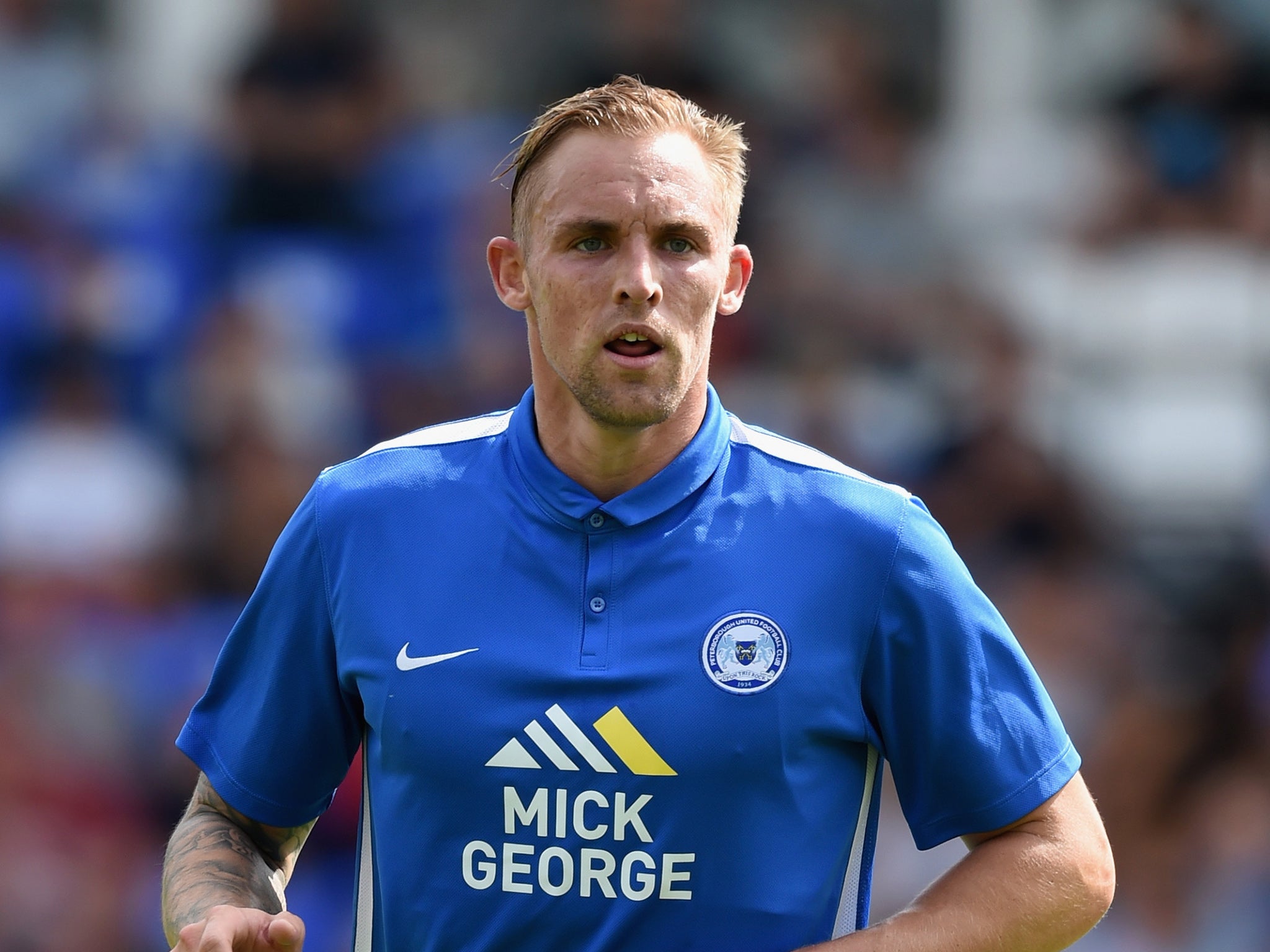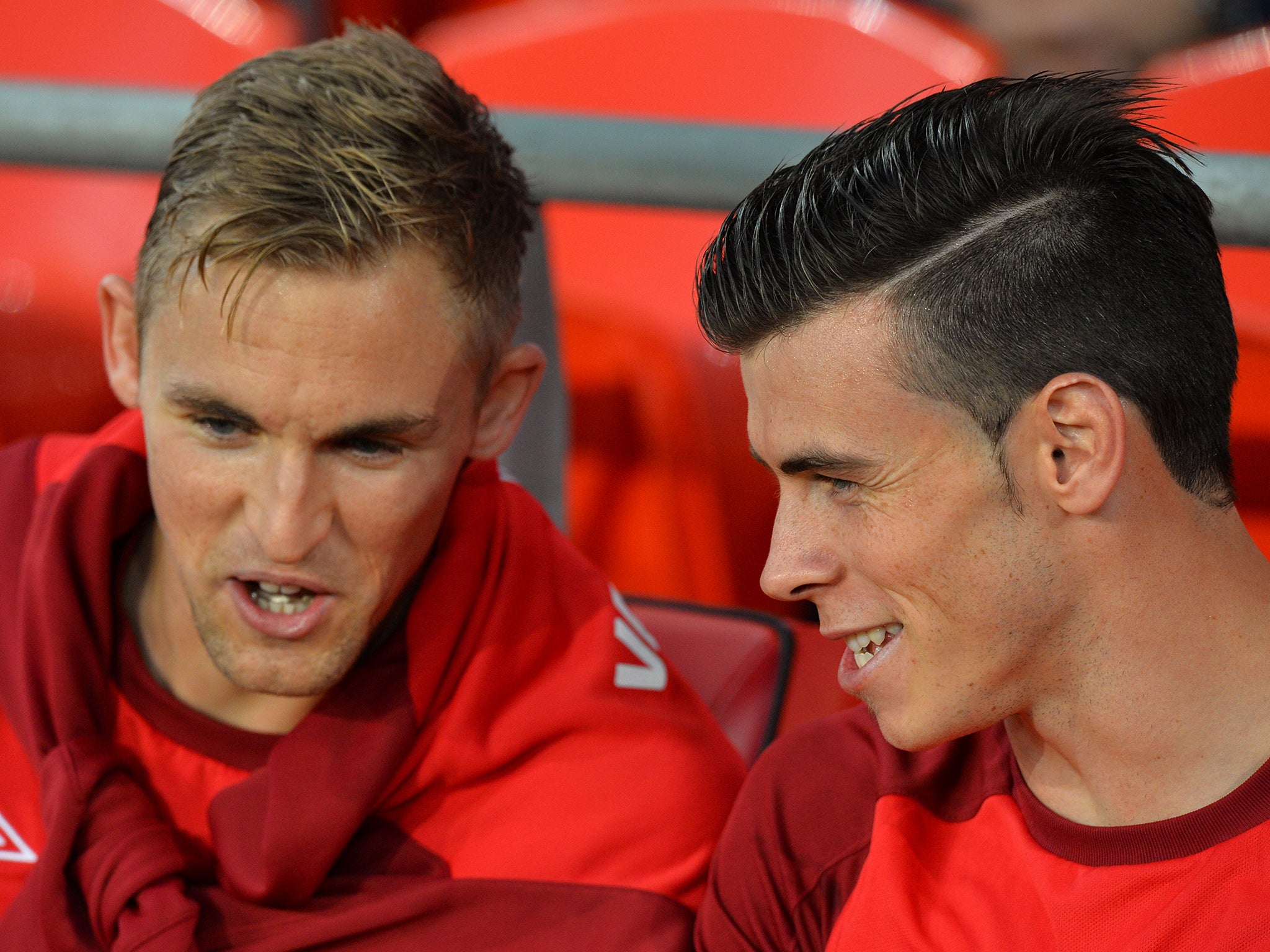Jack Collison: The story of one footballer's broken Premier League dreams
The image of a Premier League footballer is one of glamour and wealth. But for some it can be more complicated and darker than that. Like millions, the author of this article dreamt of playing a the top level. Unlike the vast majority, he made it - only to have his career shattered by a series of devastating injuries freom which he is still recovering. Here, at the age of 27, he tells his own story: one of ecstatic highs but also pain and sorrow - and growing up

Your support helps us to tell the story
From reproductive rights to climate change to Big Tech, The Independent is on the ground when the story is developing. Whether it's investigating the financials of Elon Musk's pro-Trump PAC or producing our latest documentary, 'The A Word', which shines a light on the American women fighting for reproductive rights, we know how important it is to parse out the facts from the messaging.
At such a critical moment in US history, we need reporters on the ground. Your donation allows us to keep sending journalists to speak to both sides of the story.
The Independent is trusted by Americans across the entire political spectrum. And unlike many other quality news outlets, we choose not to lock Americans out of our reporting and analysis with paywalls. We believe quality journalism should be available to everyone, paid for by those who can afford it.
Your support makes all the difference.It’s Saturday again and I’m not playing football.
I am 27 years old and I have tasted success, felt the hurt and experienced loss, all thanks to the beautiful game that is football – a game that can fill you with the highest, most joyous feelings, yet take them away with a single action, leaving you in a dark, desperate place.
When three o’clock arrives the disappointment and sadness reaches its peak. In happier times I would be strolling out on to the pitch in front of thousands of fans ready to take on some of the most gifted players in the world.
Instead I find myself searching. Searching for something to fill that void, something to recreate the extraordinary emotional highs and lows you experience during 90 minutes of kicking a ball around. It’s hard to explain that intense feeling of sheer joy to someone who hasn’t experienced it. How can you recreate that feeling of scoring a goal in front of a packed house at Upton Park? It’s impossible.
The rush is like a drug. You become addicted. You’re part of an elite club, a club I am no longer part of, a club that I long to be part of once more. I am here today fighting against the odds. I want that feeling to return. That’s why I find myself pushing my body to the limits daily, going through the pain barrier. And I am very pleased to say I am now in the position to return to doing what I love doing most: playing football.

I grew up in south Harrow, in the west London suburbs, and even from an early age I was obsessed with the game. I was the kid who always had a ball by his side, often taking a smelly, dirty ball to bed with me at night. My room was a shrine to the game, posters lining my walls, including a full-size picture of David Beckham, the player I idolised.
The garden was my arena, the place I spent hours on end practising my skills, re-enacting goals and more often than not dreaming of one day playing in the Premier League.
My mum, Amanda, took care of the family while my dad, Ian, would go out to work as a roofer. My mum was certainly the strong character, always in control. My dad, on the other hand, was a bit of a cheeky chap. He was often in trouble but he had a magnetic personality. Fortunately for me, he was just as obsessed with football as I was, and this was where my love for the game was embedded into my DNA. Chelsea were his team, and so they were mine too: the likes of Dennis Wise and Franco Zola were my childhood heroes.
Instead I find myself searching. Searching for something to fill that void
Whether it was in the playground with my friends, down the park, or playing for my local team, Shefford Saints, I would dream of playing in the Premier League. I was obsessed, and over time I began to realise I was starting to become pretty good at the game. At the age of nine I was spotted and signed for Peterborough United. We got treated like professionals even at a young age and I loved the environment. I thrived on being written off when we played the likes of Chelsea, Arsenal and Man United. This underdog spirit is something that remained within me and was always backed up thanks to the calming advice of our coach, Kit Carson. Kit really believed in me and pushed me harder than anyone else.
It was then that I suffered what was to be the first of many setbacks in my footballing life. Peterborough closed down their youth system. It was only a short-term problem, however, because alongside Kit and many team-mates, I made the switch to Cambridge United. I stayed with Cambridge until the age of 16 – and then they closed down their youth system as well.
But I soon found out West Ham were interested and had to pinch myself because that would give me the chance to work with Tony Carr, the man who had helped shape the careers of some of my idols, such as Frank Lampard, Michael Carrick and Joe Cole. West Ham was a real step up but I adapted and got my head down and worked hard. From youth team captain to reserve team captain and eventually training and travelling with the first team to games. I was so close to my dream of Premier League football, first with Alan Pardew in charge of the first team, and then under Alan Curbishley.
There were times when I wondered if it would happen – and then suddenly it did. On New Year’s Day 2008. An away game against Arsenal in the famous claret and blue of West Ham (left). I entered the field as a replacement for Freddie Ljungberg and played out the last 60 minutes in a 2-0 defeat by a very good Arsenal side. Alan Curbishley’s last words before I went on will live with me for the rest of my life. “Try and get close to Fabregas,” he said. A near impossible task for the seasoned pros, let alone a lanky 19-year-old.
I remember warming up with James Tomkins and getting abuse for our shocking haircuts. I watched on in awe of these wonderful players, thinking to myself “I’m miles away from being as good as this lot”. In truth I felt out of my depth that day, but that little taste was all I needed to inspire me to work even harder.
I struggled for opportunities after that with Curbishley in charge but everything changed for me when Zola took over as manager.
I was amazed to find out that Zola the man was even more impressive than this wonderful footballer I had watched from the terraces as a kid. He captured our imagination with his very first meeting, as he spoke with his soft voice. He didn’t have to shout, as he instantly had the respect of the entire squad. He created an excitement, a real buzz around the training ground, something that had been missing for a while.

Though I was around the squad, in my mind I still wasn’t a first-team player. But that didn’t matter to Zola, he took an interest in everyone and the extra work we did at the end of training improved my game massively. I felt I was ready but had to wait my chance. It eventually came in a cold away trip to Old Trafford. I came on for the last half hour and, though I say it myself, did really well.
The next game, Everton at home, I felt I would get an opportunity again. Every game I had featured in previously was away from the Boleyn, but this game had a different buzz. It was at home, in front of a full house. I remember walking out to warm up and stopping for a second to take it all in. the smell of the grass, the noise from the expectant crowd, the vibrant colours.
For me this was heaven. Everything I had dreamt of – and more.
I entered the pitch early on as a substitute and got a huge roar from the home faithful, which gave me a huge boost, and I set about my work trying to impress. In a tight game I finally got the chance I longed for.
A long ball over the top to Scott Parker, he managed somehow to flick it back into my path. I took a touch out of my feet and opened my body up…
At this moment everything stood still, the noise stopped, I looked down at the ball and tried to make clean contact. The ball slowly sailed past Tim Howard and into the top corner. All of a sudden the noise erupted, the colours became even brighter. I had just scored my first goal in the Premier League and this intense feeling shot through my body. Sheer excitement, joy and disbelief all at the same time. Although we lost the game 3-1 that feeling has always stayed with me, and I think that moment was the start of my special bond with the West Ham fans.
Over the next few seasons we experienced plenty of highs and lows together. I had a great run in the team under Zola, but just three days after scoring a winner against Manchester City in March 2009 my footballing world fell apart. On a cold, wet night at Wigan I tried to bring the ball down on my chest and I felt my knee go as I tried to run in the opposite direction. I knew it was a bad one straight away, I gripped on to the grass trying to stop the intense pain shooting through my leg but nothing would work.
I couldn’t quite believe what had just happened. I was disappointed the next day when I found out the club doctor was content for me to fly to Spain on a team trip rather than to get my knee sorted. This was one of the first times I realised there was more that went on behind the scenes. People were in it for themselves, and over the next year I felt how little regard there was for me as a young professional. I considered I had been put at risk by this doctor to avoid him having a long-term injury on his hands. How disappointing was that?
I patched the knee up and made a return a couple of months later, but as time wore on I knew it didn’t feel right. It was a tough decision but eventually I knew I had to have a big operation. I managed to play over half the season, but we were struggling in the League and it got to the point where I was hardly training and just playing games with the promise I could see the best people in the world to make it right at the end of the season.
I didn’t make it to the end of the season and had to go in myself and tell the manager that I could no longer continue. He seemed shocked and I’m not sure to what extent he knew of my situation with my knee. Once again I felt the doctor’s agenda was very different to mine and being naive and not wanting to miss any football I went along with the plan, not realising the lasting effects it could have on my career.
It was during this tricky time I also lost my dad. He was killed in a motorcycle accident and I can remember the day as if it were yesterday. Everything about it. Tottenham at home in the League, a game my dad would have been at. I remember coming into the players lounge afterwards and noticing my dad wasn’t there. It wasn’t strange for my dad to go missing, but this felt different. I tried to call and text but there was no reply.
I headed home and remember settling down to watch highlights of the cricket. Then my buzzer went. As I looked out of my flat window my heart sank. I could see the police waiting to come in. “What’s going on?” I thought, and all the time in my head I was thinking: “It must be dad”.
At first I thought he had got himself in a spot of bother. But as the policeman spoke to me, I knew it was more. He had a sad look in his eyes and struggled to make eye contact with me. And then he uttered the devastating words: “Your dad has been involved in a fatal motorbike accident.” I felt numb. I felt empty. I was upset, annoyed and in a complete state of shock.
Emotion was running through me as I burst into tears. I couldn’t control them as I made the phone call to my mum to let her know what had happened. I was 20.
It’s hard to explain exactly how I felt, but I decided to play in a cup game three days later and I knew it was the right thing to do. It was a massive game against Millwall, our local rivals, and I knew my dad would have been there cheering me on under the lights at Upton Park. It was such an emotional night and one that I will never, ever forget. This was the night the football family came together. My team-mates, the staff and the West Ham fans carried me through what was the toughest game of football I have and ever will play in.
The intense feelings were very different. It’s hard to find anything that can make you feel 10-feet tall when all you want to do is roll up into a ball and cry and let the world swallow you up.
I battled on for much of that season despite my chronic injuries then eventually had the operation. After that I worked day and night for 14 months alongside some of the best people I have ever met in the game. When you talk about being tested, this period in my life was definitely the toughest, but it was also the time when I learnt the most about myself as a person. I grew up and had to become a man.
My first start after this was one of mixed emotions. Once again, we had Wigan away. I had worked so hard to make it back and was desperate to try and do my bit for the team. We were really struggling in the League, and I was helpless throughout the whole season, kicking and heading every ball as a fan, it really was torturous.
Strangely the day of my comeback – 15 May, 2011 – also turned out to be the day that we got relegated. It’s hard to explain, but I felt so grateful at the time to be out on the pitch again that the disappointment of being relegated took slightly longer to hit me then it did for some of the others.
Relegation meant the end for Avram Grant and in came Sam Allardyce. The following season, under Big Sam, was possibly my most successful in a West Ham shirt. I played 36 games and scored vital goals to help win promotion back into the Premier League. And there were more of those ecstatic highs when I scored twice in the play-off semi-final to help us on our way to Wembley. This feeling was heightened when we beat Blackpool 2-1 on the big day in front of a packed house.
It’s hard when in your heart you feel like you can play football but your body can’t quite do what you want it to.
On a personal level I struggled throughout the game with my shoulder and my knee, but there was no way I was going to come off. It was a day you dream of as a kid, and going up the stairs to collect my medal was a special moment, one that fills me with pride when I think back on it.
But if that was an unforgettable high, there were plenty of lows to come in the next two seasons as I battled against injury once again and struggled to force my way into the team. Knee troubles were once more the root of the problem and limited my playing time once again. Two short loan spells and another injury were to follow.
By the end of the 2013-14 season I found myself without a club and out of contract. Of course I was disappointed to be leaving West Ham. It was all that I had known since I was 16. This was a club I had sweated, bled and often played on injured for. It was also a club I had grown to love. In my heart I knew my time was coming as I hadn’t been playing, but it was very difficult to let go.
Last season was another wasted one for me, a brief spell at Ipswich followed by another injury left me once again in a very dark place and without a job. It was at this point that I took the time to re-evaluate and made the decision to have some time away from football. I felt I needed to let my injuries heal and to give myself the best chance of a comeback.
It was a very difficult decision to make. It’s hard when in your heart you feel like you can play football but your body can’t quite do what you want it to.
I put my head down and worked hard, day and night to get my body right and be able to go back to playing. I also used my spare time to set up the Jack Collison Soccer School, start a university degree (in sports journalism) and begin my coaching badges. All of the areas would be of value to me if I didn’t quite achieve my goal. But I did them all as a back-up, never once doubting that I would make it back on to a football pitch.

During the darkest times I was very lucky to have strong people around me. Having a daughter and a supportive fiancée helps when you really hit the floor. Coming home after a tough day, it’s nice to have to chase a crazy two-year-old around. It really helped take my mind away from the bad stuff and appreciate what I do have.
Finally in June I felt I was ready. I was fit and in shape, ready to train and once again on the look-out for a new team. I eventually signed for Peterborough United. It felt right, with the slightest hint of a fairytale in that I was going back to where it had started all those years ago as an energetic nine-year-old.
But even now my story is not over. I have played quite a few times for the Posh this season but not as much as I would have liked. I’m still working day and night to improve and get back to playing week in, week out.
The dream is still there but the reality of a footballer’s life is not quite what I imagined as a kid growing up. I am 27 now and looking back at my football life, I have experienced a wide variety of feelings and challenges. Some amazing, and so intense that they make me tingle when I think about them. Others not so good, but which have helped me grow as a person.
I feel very thankful for everything I have and if you ever see me on the pitch nowadays, more often than not I will have a huge smile on my face. I treat every game, every training session and every moment on the grass as if it will be my last. I try not to get too carried away with being disappointed as it is an accomplishment in itself that I can call myself a professional footballer.
I look back on it all as a great adventure, a story with plenty of ups and downs. I feel blessed to say that this is my story and one that I hope still has plenty in it. I am very thankful now when three o’clock on Saturday arrives and even more so if I am playing.
Because there is one thing I know for sure. And that is that I am Jack Collison… the footballer.
Join our commenting forum
Join thought-provoking conversations, follow other Independent readers and see their replies
Comments